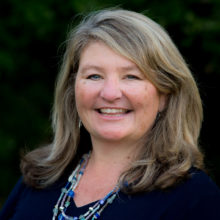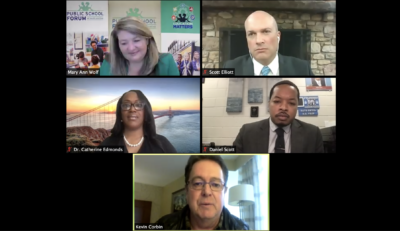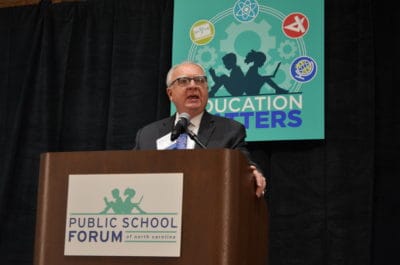The following is Mary Ann Wolf’s “Final Word” from the Jan. 30, 2021 broadcast of Education Matters: “COVID’s Impact on Education.”
Much of the discussion in education has started to look toward the transition and recovery from COVID-19. It is encouraging that we can begin to consider policies and resources that should be in place so that educators, schools, and districts can be sure that each student has the academic, social, and emotional learning support they need, especially after this year.
However, these discussions also come at a time when school districts across North Carolina continue to operate in hybrid and remote learning settings — and safety for all remains a major concern. Not surprisingly, COVID-19 and the inequities exacerbated by the pandemic were top of mind as educators, policymakers, state and district leaders, students, and other education stakeholders gathered virtually this week for our annual Eggs & Issues event hosted by the Public School Forum.
In hearing from a member of the N.C. General Assembly, an educator, and local school district superintendents, we are reminded in a very profound way how COVID-19 has impacted our students, educators, and communities. We are also reminded of the heroic efforts of our educators, schools, and families to support our students every day.
As a state, we are at a critical moment in which we must take great care to deeply understand the immediate and long-term challenges our schools, families, and students face and to develop policies and provide resources and flexibility so they can meet the needs of each of our students.
Education stakeholders are identifying shared concerns and working together to address immediate needs and accelerate the recovery from COVID-19. The resulting solutions and recommendations for policymakers include addressing needs that begin with early childhood learning all the way through postsecondary attainment, with many K-12 concerns addressed in between.
Equitable and robust access to broadband as well as developing learning environments that keep safety at the forefront continue to be critical issues for our schools and families. We continue to develop solutions that address immediate needs, while also concocting long-term solutions to these issues that require multi-stakeholder support.
We know that addressing social and emotional learning through effective interventions and programs leads to significant gains in academic outcomes and COVID-19 has only increased the needs in this area for our students.
Schools need the resources for professional learning and programs to address this. Districts across the state need additional funding to meet the recommended number of social workers, counselors, nurses, and psychologists that should be employed in their schools.
This year has only added to the challenges in recruiting and retaining a diverse teacher and principal workforce across North Carolina. Our state can invest in innovative educator preparation programs and other career pathways for individuals who are interested in education while also providing support to those who are in the early years of pursuing this important profession.
Districts understand their own local needs best and ensuring that they have the flexibility they need with developing school calendars, expanded learning opportunities and allocating funding to rethink what our students need in the coming years will be critical. This is another opportunity for policies to support our students and schools.
Addressing each of these and other critical issues requires resources and funding. But with the appropriate policies and resources, the investments will help with the immediate needs of our schools and districts as we begin the recovery from COVID-19; and they will also support critical areas for long-term efforts to ensure that every child in North Carolina has access to a sound basic education and will graduate prepared for college, career, and citizenship.
North Carolina is fortunate to have resources available to address the needs of our schools and students, the understanding of what is needed, and the will of education stakeholders and policymakers to enact purposeful and effective policies. We must use this critical point in time to lay the groundwork for accelerating investments and innovations in education for all of our students.



